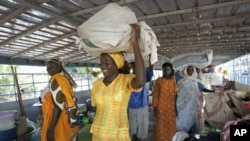With the referendum on southern independence just 19 days away, humanitarian organizations in Sudan are preparing for the possible results by moving three months of emergency supplies into areas where they think conflict could occur.
The World Food Program's warehouse in Southern Sudan's capital, Juba, is a busy place. A truck loaded with 28 metric tons of sorghum has arrived from the Kenyan port of Mombasa. Workers move the bags into another truck headed to the neighboring Western Equatoria state.
Warehouse supervisor Victor Achawa said the trucks keep coming all day. "Every day, you can receive more than 20, 24 trucks ..."
The food coming into Juba and headed throughout the south is part of humanitarian preparation for the referendum on southern independence.
On January 9, 2011, southerners will vote on whether to become an independent nation or remain united with the north. The vote is the centerpiece of a 2005 peace deal between north and south that ended Sudan's 21-year civil war.
A deep mistrust remains between north and south. Southerners are expected to vote overwhelmingly in favor of separation. But there is widespread concern the north will not allow a peaceful separation. So humanitarian organizations in the south are preparing for the worst.
"We are convinced that the referendum process is going to play out in a fully successful way," said
Lise Grande, the U.N. deputy resident and humanitarian coordinator in Southern Sudan. "But as humanitarian agencies, we are obliged to prepare for a worst-case."
Agencies in Sudan requested $35 million in funding from international donors. That does not include food aid, the most expensive single part of the request. If not for an early donation to cover food, the request would be more than $100 million.
Three months of emergency supplies are being distributed to warehouses in the south right now. There is food aid, medical supplies, water and sanitation supplies, seeds and tools so people can produce their own food. There also are nutrition supplies and non-food items, like buckets and blankets.
"All six [warehouses] of them are prepositioned in locations all throughout the south, but particularly what we call flashpoint areas, areas that might experience trouble," said Grande.
According to Grande, agencies have looked to the south's recent past to predict where aid could be needed most. "It would be along the border areas, there are also areas where the LRA have been effective in the past that we are concerned about, there are areas where there have been internal troubles in the south that we are keeping an eye on."
Humanitarian agencies have a long history of working in Southern Sudan. During the war, the United Nations ran a program called Operation Lifeline Sudan. Starting in 1991, U.N. organizations like the World Food Program and UNICEF organized aid deliveries into areas controlled by the southern rebel army.
According to the WFP head of office in the south, Leo van der Verlden, the agency was forced to fly in most of the food during the war and have made road improvement a priority since the war ended.
"In the last five years, we have rehabilitated 2,600 kilometers of roads in south Sudan which was partly because before we had to fly everything in," said van der Verlden. "Nowadays it is more or less on truck or we use also barges over the Nile from Kosti."
In addition to roads, the United Nations is repairing airstrips and building warehouses and fuel depots. While it is cheaper to transport food from the north, the World Food Program is also able to bring it in from Kenya, in case northern routes to the south are closed.
According to van der Velden, one of the biggest challenges that remains is convincing the southern army that humanitarian aid should reach anyone who needs it, no matter the political circumstances.
"They have no idea about privileges and immunities for humanitarian workers, which means we can be arrested or hampered or sometimes trucks are commandeered just because there's a lack of understanding," said van der Verlden.
Van der Velden added that there have been major improvements in the past two months in the treatment of humanitarian workers in the south.




